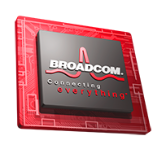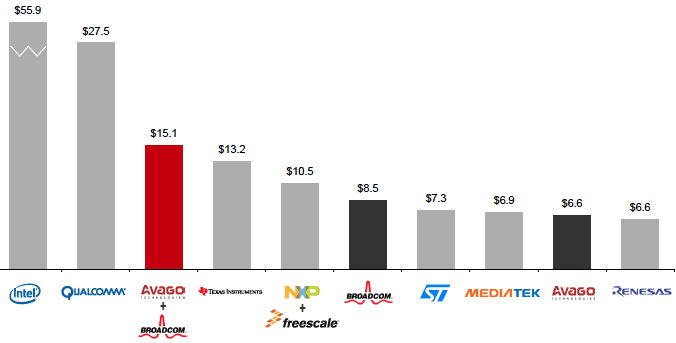Avago-Broadcom Deal Creates Comms Chip Leader

The inexorable shift of chip making to Asia continued this week with the announcement that Singapore-based semiconductor manufacturer Avago Technologies Ltd. will acquire U.S. mainstay Broadcom Corp. in a cash and stock deal valued at $37 billion.
Broadcom, Irvine, Calif., a leading communications chipmaker, is a big catch for Avago, which said it plans to rebrand itself as Broadcom Ltd. once the transaction closes. The combined company would be one of the world's largest chipmakers measured in terms of annual revenues.
Under terms a of definitive agreement announced Thursday (May 28), Avago said it would pay $17 million in cash along with 140 million shares of Avago stock valued at $20 billion as of its closing share price on May 27.
The blockbuster Broadcom deal is the latest in a series of moves by Avago, which acquired a networking chip company last year while shedding some of its storage assets. The Asian powerhouse looks to be leveraging its manufacturing expertise in the booming wired and wireless communications markets.
Avago CEO Hock Tan called the deal "a landmark transaction for the semiconductor industry" that would make the combined company the world's third largest chipmaker, trailing only Intel and wireless specialist Qualcomm.

Global chip rankings by annual revenue. (Source: Avago Technologies)
Broadcom is a dominant supplier of chips for Ethernet switches based on its Trident and Dune family of ASICs. Lately, it has faced growing competition from switch makers like Cisco Systems and Hewlett-Packard along with merchant chipmakers like Intel and Marvell, among others Ethernet ASIC startups.
In an attempt to fund off rivals, Broadcom introduced its Tomahawk line of Ethernet ASICs last September as a way to unclog choked datacenter networks.
The combination of Avago and Broadcom merges wired and wireless communications know-how with first-rate chip manufacturing. The combined company is expected to generate annual revenues totaling about $15.1 billion—including $8.5 billion from Broadcom—stemming from its wired infrastructure, wireless communications, enterprise storage and industrial networking lines of business.
Avago, which has offices in Silicon Valley, specializes in analog devices used in enterprise storage. Last June, it acquired PCI Express specialist PLX Technology for $309 million in cash. Avago said the PCI Express products would complement its server-storage networking ASIC products used in datacenters. PCI Express chips are used along with connectivity software in enterprise datacenters.
Last May, Avago sold its Flash Components Division and other assets to Seagate Technology for $450 million in cash.
As datacenter spending begins to tail off, company executives said they are targeting emerging markets like the Internet of Things. Device shipments are expected to surge at a compound annual growth rate of 34 percent, according to market forecasts cited by Avago.
Broadcom CEO Scott McGregor said during a webcast that "significant size and scale are becoming increasingly important" as the chip industry evolves to meet the demand for connecting everything.
Avago said Broadcom co-founder Henry Samueli will serve as chief technology officer of the combined company.
Tan noted that there would be "zero" product overlap in the combined company. Therefore he did not expect to divest parts of either company while achieving synergies through each company's wireless and wired portfolios.
The transaction, which is subject to regulatory approvals in the U.S. and Asia, is expected to close by the end of the first calendar quarter of 2016.
Related
George Leopold has written about science and technology for more than 30 years, focusing on electronics and aerospace technology. He previously served as executive editor of Electronic Engineering Times. Leopold is the author of "Calculated Risk: The Supersonic Life and Times of Gus Grissom" (Purdue University Press, 2016).











